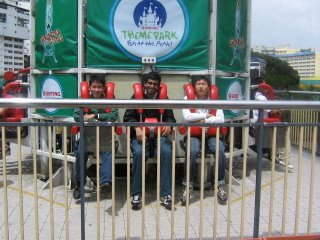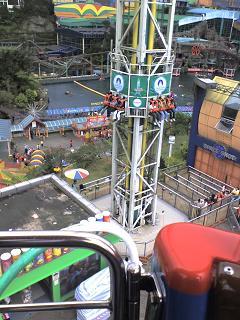My KL-Genting-Sunway trip...Day 2..to be cont'd
The day before we went Genting, we approached one of the hotel staff to facilitate our booking of a transport that could ferry the total 13 of ours there. After much deliberation, we settled for a van which costs about $250 for the 2 way journey if I am not wrong. The staff promised that the van could accommodate 13 people but we said we may split into 2 groups: One following the van, the other taking a taxi. So he said why don't about 9-11 people take the van and the others take a cab. We said ok and paid in advance the night before.
 On the morning itself, I had a wonderful meal of breakfast in the hotel. The usual nasi lemak, juices, fruits, porridge, bread, sausages, eggs.
On the morning itself, I had a wonderful meal of breakfast in the hotel. The usual nasi lemak, juices, fruits, porridge, bread, sausages, eggs.After that, we waited for the van to arrive at 10am. When the van driver came, he said that the van can only take a maximum of 12 person. That wasn't what we agreed on. Feeling frustrated, we contacted the manager to speak to the driver. He even called up the staff who promised that the van can carry 13 people. Now we have 12 person as one of us wanted to visit his friend in KL. Does that mean that the extra one has to take a cab himself?
The whole commotion took about half an hour before the van driver was called off. A hotel lobby staff approached us and told us that he can get for us a 12 person transport at a cheaper price of $200. Shortly about 20 mins, the transport came and we finally were on our way to genting. The journey took about 1 hour, through the newly-built road which is less steep. The admission fee was $23 for unlimited rides on both the indoor and outdoor rides.

We took some photos before we went for the rides...


We started on a gentle ride called the 'cyclone'. It seems easy but I screamed the hell out of myself during the ride. The slope was so steep and we were moving very fast. Indeed, it was a warm-up for us.


The next ride was called 'The space rocket', whereby you are brought up to a tremendous height and in a flash you will be under the force of gravity, descending vertically downwards rapidly. I chickened out during this ride as it was really towering compared to the one in Taiwan. Instead, I formed a group of three with patrick and Weiren to be the outcast and took the ferry wheel. haha. The ferry wheel took us for 3 rounds, ourselves bracing the shivering cold wind.

Eddie, Suran and Jian Wei in position for the ride.

Up they go....

After a taste of the space rocket, everybody was on high spirits, then we went on to the 'corkscrew roller coaster'. The ride wasn't as scary as I expected and it was the most thrilling ride I ever taken before; the only ride in Malaysia with 2 loops.

Next up, we went to the 'superman'. It costs Rm10 for 5 rides which didn't appeal very much for me and some others. Each cycle takes on 4 person, lying down like a superman as you fly around.



Everyone was tired after the 'superman'. I was still active and energetic, burning with passion to go for the indoor rides but no one had the fuel to keep on going with me. Feeling hungry, we went for lunch at KFC as the rain came in!!! What a waste of time and money coming here.


All the outdoor rides were closed due to the rain but we managed to hitch a ride on the spinner which left me spinning after that. So we left at 4pm heading towards the hotel.

For dinner, we had it at nandos which serves an appetizing spread of fries, chicken, together with different flavours of chilli sauce.









